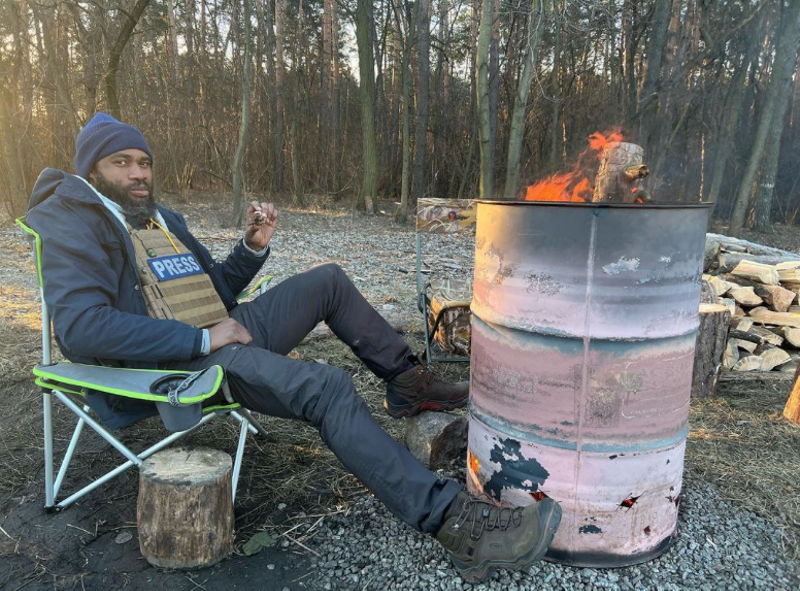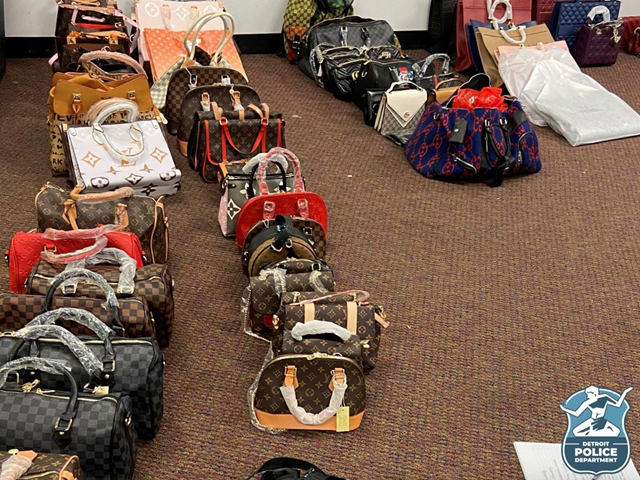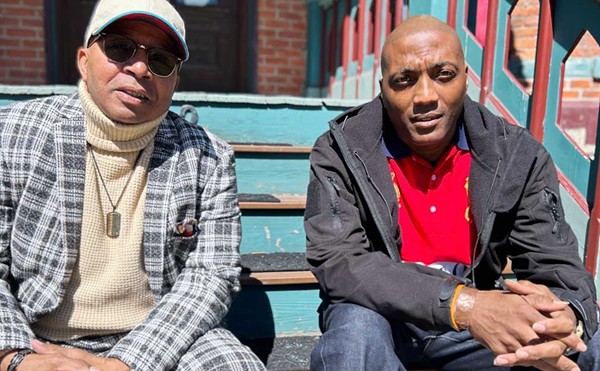
Instagram, @terrelljstarr
Terrell Jermaine Starr takes a rest from reporting in Ukraine.
Terrell Jermaine Starr will never get used to war.
The Detroit native has been in Ukraine since January. He was only supposed to be there for three weeks.
Then came the Russian bombs, destroying homes, apartment buildings, grocery stores, shopping centers, a maternity ward, a children’s hospital, and disabled care home. Thousands of people have been killed, and more than 2 million have fled Ukraine.
Instead of making a run for it, Starr is using his 15 years of experience as a journalist to tell the stories of everyday Ukrainians who are trapped in a war zone.
“I never envisioned doing any of this shit. War is hell,” Starr tells Metro Times in a 45-minute interview Thursday. “As journalists, we have to cover death and pain and agony. I wished we were in a world where we didn’t have to. Every day I remind myself that this isn’t normal. We should never be doing this.”
Psychologically, the war has taken a toll on him, says Starr, whose style of compassionate, opinionated journalism makes him a unique and irreplaceable voice in a country that needs outspoken supporters.
“I’m not a stenographer,” Starr explains. “I don’t just print what happens. I’m outspoken about this not being healthy. This is bad for humanity.”
Starr grew up Black and poor on Detroit’s west side, living with his grandmother at Scotten Street and Tireman. When he was 10 or 11 years old, a battle between drug dealers led to the firebombing of a house that killed his friend. He'll never forget the blond-haired, blue-eyed television reporter who came to his house to interview his grandmother.
“We didn’t trust her,” Starr says. “That was my first interaction with a journalist. She wasn’t a bad person, but she was an outsider and didn’t know she was an outsider. I don’t ever want to be that type of journalist in [a] community that isn’t my own. When I’m in Ukraine, I don’t want to be that white woman. I want people to know I care about them and am invested in them and their dignity.”
While many journalists flock to Ukraine to cover the cold, hard facts of the war, Starr rolled up his sleeves and began helping Ukrainians in need. When a cancer patient was displaced from a hospital that was filling up with Ukrainians wounded in the war, Starr crisscrossed the country for several days in a car to help the woman get medical treatment outside the country. He weaved it into his reporting of the war.
Starr gets some criticism for inserting his feelings into his reporting, but he doesn’t let that bother him because he is committed to a type of journalism that has a heartbeat.
“Traditional media has always been the white man’s diary,” Starr says. “To see a journalist like myself taking over the style of how news is delivered, it is considered non-objective or biased because we’re not used to Black people being a dominant voice in news coverage. We’re redefining how news delivery looks.”
A non-resident senior fellow at the Atlantic Council, a Washington-based nonpartisan group, Starr is an independent journalist who shares what he sees with his 365,000 followers on Twitter and 24,600 on Instagram.
He relies on crowdfunding for donations from CashApp, Venmo, or PayPal.
Mission accomplished!
— Terrell Jermaine Starr (@terrelljstarr) March 8, 2022
Irina, her mom and child are on the bus to Lithuania, where she’ll get her lifesaving medical treatment. Her husband is with them on the bus, hoping he’ll be able to join the family. (Men 18-60 aren’t allowed to leave Ukraine now because they’re draft age.) pic.twitter.com/PeoQ1v1Miz
“I paid for everything to come here,” he says. “That was part of the sacrifice I made. No one gave me anything. I was just here to gain my own knowledge. I would write an article here and there.”
He visited Ukraine to “gain cultural knowledge.” It was not his intent to cover a war.
“I had no idea I was going to be a war correspondent,” he says. “That was a real shock to me. It was a big adjustment.”
He adds, “I decided to stay here because I wanted to document what was happening because I’m a journalist and this is my second home and I wanted to support the people I love and care for.”
Since the war broke out, Starr has appeared on major news outlets such as CNN, MSNBC, and NPR, and he’s carved out a loyal following that appreciates his unique voice and compassion for Ukrainians.
Starr got into journalism relatively late in his life. At 26, he was working on a master’s degree in journalism from the University of Illinois and put in his time at the school’s newspaper. He was 28 when he landed his first real journalism gig covering city hall meetings and other local issues for Illinois Public Radio.
After that, he struggled to find a job at conventional news outlets.
“I wasn’t able to find work in traditional markets,” Starr says. “I was working in Black media.”
It turned out to be a blessing. Without a job in conventional journalism, he developed his voice.
By the time war broke out in Ukraine, Starr was perfectly suited to cover the invasion. He’d been coming to Ukraine since 2009, beginning when he was selected as a Fulbright scholar. At first, he’d spend a few months in Ukraine until he eventually lived half the year there and the other half at his home in Brooklyn, New York.
“The thing about Ukraine, it had a hold on me,” he says. “You either have the bug or you don’t. I think we can fall in love with any country. Ukraine is one where there is nothing in particular that is distinct. I just fell in love with the place.”
His interest in Eastern Europe began when a missionary program selected him to serve in Russia when he was 20 years old. At first, he was disappointed. When he applied, he asked to go to Africa, the Caribbean, or South America.
“I said, ‘Jesus Christ, I don’t want to go to Russia. Seriously,’” he recalls thinking. “I grew up in Detroit, the biggest Black city in Detroit. I didn’t want to be around all those white people.”
The trip changed his life. He volunteered at a Russian orphanage and applied for the Peace Corps, which took him to Georgia, where he taught English for two years. He now speaks Russian and Georgian.
As a Black man in a predominantly white region, Starr has a unique perspective that allows him to understand the plight of Ukrainians. Russians look down on Ukrainians as inferior, not unlike how many white people have historically viewed Black people.
“There is a Russian supremacy that Putin is pushing out of the Kremlin,” he says. “Being Black, I understand what Ukrainian oppression looks like. Most white people don’t understand what oppression looks like. As a Black man who knows what it looks like, I know how to express it. I treat Ukrainians as a Black man would want to be treated — with the same dignity and respect that I expect of other people covering my community.”
Starr plans to leave Ukraine in April and briefly move back to his home in Brooklyn before visiting Asia. He says he’ll return to Ukraine in June and stay until October.
But he won’t be just reporting.
“I’m going to be involved in humanitarian efforts,” he says. “My heart is with the Ukrainian people, and I am going to be giving them the best I have with my journalism and my goodwill.”
Beyond that, Starr isn’t quite certain what his future holds.
“It’s in me to do this type of work,” he says. “I have no children, I have no wife, I have no girlfriend, I have no tether to anyone outside of family. When that changes and I have a dynamic with a family, of course, that’s going to change. But as long as I’m single and I have no attachments, I am going to do exactly what I’m going to do.”
Stay connected with Detroit Metro Times. Subscribe to our newsletters, and follow us on Google News, Apple News, Twitter, Facebook, Instagram, or Reddit.






